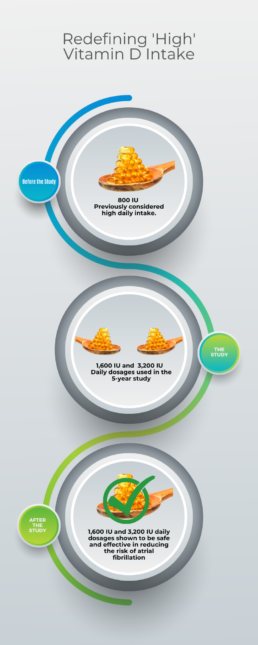Important Recent Study
Atrial fibrillation, aka a-fib, is a common heart rhythm disorder and is a significant concern, especially for older adults. It increases the risk of stroke, heart failure, and even death. Research over the years has shown light on the vital role of certain nutrients like Vitamin D in overall health and, more specifically, cardiovascular health.
A recent study from the University of Eastern Finland shows that a higher than recommended Vitamin D intake over an extended time can considerably mitigate the risk of atrial fibrillation in older adults. In layperson’s terms, it may support the prevention of a-fib. This fascinating revelation could have massive implications for preventative health strategies, highlighting the importance of ideal nutrition for heart health.
At Bionox, our Ultimate Nitric Oxide Nutrition offers a balanced blend of critical nutrients, including Vitamin D, to bolster heart health and overall well-being.* Since our company’s inception, we have understood the importance of Vitamin D.

The Finnish Vitamin D Trial
The study published in the American Heart Journal is based on the Finnish Vitamin D Trial (FIND) carried out from 2012 to 2018. The core objective of FIND was to examine the correlation between Vitamin D supplementation and the incidence of cardiovascular diseases and cancers.
The five-year study comprised 2,495 participants, including men aged 60 and above and women aged 65 and above. These participants were randomized into three groups: a placebo group and two Vitamin D3 supplementation groups. One group received 1,600 International Units (IU) daily, and the other received 3,200 IU daily of Vitamin D3. Additionally, all participants were permitted to take their Vitamin D supplement, up to 800 IU per day, which was the recommended dosage for this age group at the beginning of the study.
The study monitored the participants closely, providing detailed input on their lifestyle, nutrition, risk factors, and disease occurrence. Many participants were randomly selected for more in-depth examinations and blood tests.
Vitamin D: A Protective Shield
During the study, 190 participants were diagnosed with atrial fibrillation. Among them, 76 were from the placebo group, 59 from the 1,600 IU group, and 55 from the 3,200 IU group. Remarkably, the risk of atrial fibrillation was found to be 27% lower in the 1,600 IU group and 32% lower in the 3,200 IU group compared to the placebo group.
At the outset, the mean baseline serum calcidiol concentration, a marker of the body’s Vitamin D status, was relatively high at 75 nmol/l. After one year, the mean calcidiol concentration rose to 100 nmol/l in the 1,600 IU group and 120 nmol/l in the 3,200 IU group. Interestingly, the placebo group showed no significant change in the calcidiol concentration.
What sets this study apart is that it is the first randomized controlled trial that showed Vitamin D supplementation reduces the risk of atrial fibrillation in generally healthy men and women. Previously, only two randomized trials attempted to observe an effect but used relatively smaller doses of 400 IU or 2,000 IU per day. Although further research is warranted to validate these results, these findings are undeniably promising.
It’s important to note that the dosages of Vitamin D used in this study exceed the daily recommended values. Yet, they were shown to be safe and effective over the five years. This point emphasizes that Vitamin D, even at higher dosages, can be safely incorporated into our diet to provide significant health benefits potentially.
New Perspectives
Historically, the recommended daily Vitamin D intake was up to 800 International Units (IU) per day. This dose was considered adequate to fulfill the body’s needs and maintain good bone health. However, the Finnish Vitamin D Trial upends this conventional wisdom by demonstrating the safety and efficacy of what was previously considered ‘very high’ intakes of Vitamin D – doses of 1,600 IU and 3,200 IU per day.
The study participants who took these higher doses over five years demonstrated no adverse effects and exhibited a significantly lower risk of atrial fibrillation. These findings challenge the traditional view on Vitamin D dosage, suggesting that higher intakes could be both safe and beneficial in cardiovascular health.
As the scientific understanding of Vitamin D evolves, these ‘high’ intakes could become the new normal for optimal health and wellness.
Ultimate Nitric Oxide Nutrition by Bionox: The Vitamin D Advantage.
At Bionox, our Ultimate Nitric Oxide Nutrition amalgamates essential nutrients, including Vitamin D, to foster heart health. Vitamin D has shown its potential in reducing atrial fibrillation risk, and by integrating this vitamin at appropriate levels in our nutritional supplement, we aim to provide a comprehensive dietary solution to our consumers.
The Finnish Vitamin D Trial underlines the power of essential nutrients, like Vitamin D, in mitigating the risk of conditions such as atrial fibrillation. The research validates the effectiveness of a comprehensive nutritional strategy, as provided by Bionox’s Ultimate Nitric Oxide Nutrition, in promoting heart health and overall well-being.
Bionox continuously strives to integrate and apply insights from the latest scientific research into our products. By offering a unique blend of essential nutrients, we empower you to live a healthier and more vibrant life.
Besides the many benefits mentioned in this study, Vitamin D plays a vital role in many bodily functions, including supporting Nitric Oxide Synthase functions and subsequent Nitric Oxide production.
Nitric Oxide is a vital molecule in the body, influencing various physiological functions, including vasodilation – the widening of blood vessels. This process enhances blood flow and the supply of oxygen to tissues. Nitric Oxide Synthase is the enzyme that catalyzes the production of Nitric Oxide in our bodies.
Vitamin D influences Nitric Oxide Synthase in several ways. Firstly, it stimulates the production of Nitric Oxide Synthase, increasing Nitric Oxide synthesis. Additionally, there is evidence suggesting that Vitamin D could enhance the biological availability of Nitric Oxide by reducing oxidative stress. Oxidative stress can limit Nitric Oxide availability by transforming it into a harmful compound known as peroxynitrite. Vitamin D helps preserve Nitric Oxide by mitigating oxidative stress, upholding or extending its beneficial effects.
To learn more about the study visit www.uef.fi/en.
